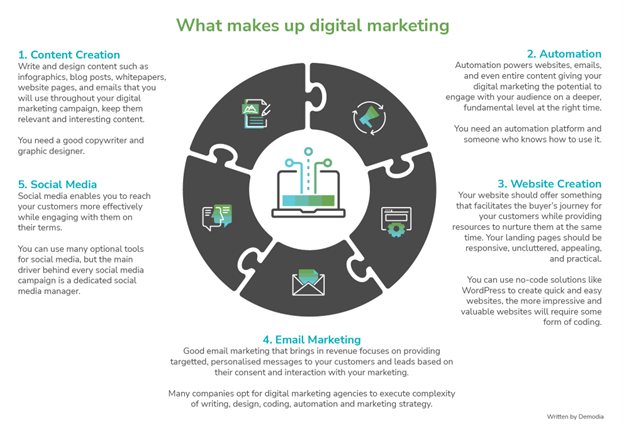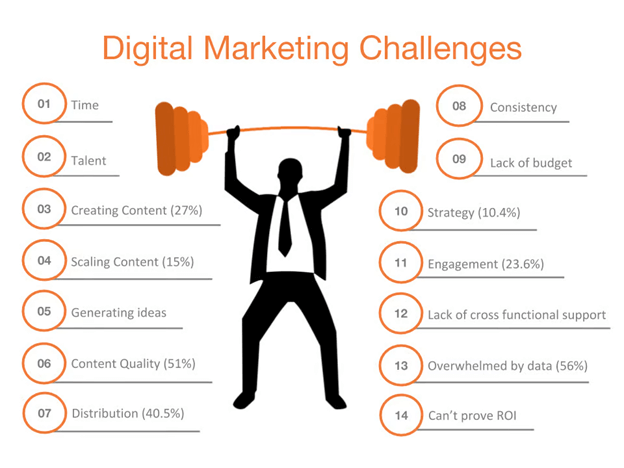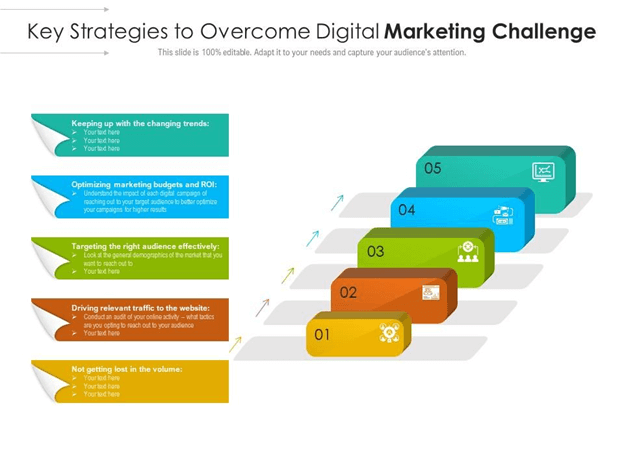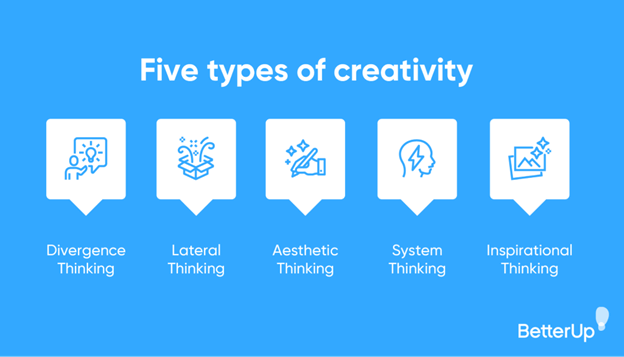SHARE

In today’s ever-evolving digital landscape, businesses face numerous challenges when marketing their products and services online.
From understanding the complexities of digital marketing to navigating algorithm changes and addressing data privacy concerns, there are various obstacles that marketers need to overcome.
However, tackling these challenges head-on and achieving digital marketing success is possible with the right strategies and a creative mindset.
This article will explore the critical components of a successful digital marketing strategy and dive into effective strategies for overcoming common obstacles.
We will also discuss the role of creativity in resolving digital marketing issues and the importance of future-proofing your digital marketing strategy.
 Understanding The Complexities of Digital Marketing
Understanding The Complexities of Digital Marketing
The world of digital marketing is multifaceted and ever-changing. What worked yesterday may not work today, as digital platforms and algorithms continuously evolve.
Marketers must keep up with the latest trends, technologies, and consumer preferences to stay ahead of the competition. One of the key challenges in digital marketing is understanding the complexities of the various channels and platforms available.
Each channel requires a unique approach and strategy, from search engine optimisation (SEO) to social media marketing, email marketing, and content marketing.
When it comes to search engine optimisation (SEO), marketers must navigate through a maze of algorithms and ranking factors to ensure their website appears at the top of search engine results pages.
This involves keyword research, on-page optimisation, link building, and staying current with the latest SEO best practices. It’s a constant battle to outrank competitors and secure a prominent position in search engine rankings.
Social media marketing, however, requires a deep understanding of different social media platforms and their respective audiences.
Marketers must tailor their content to suit the preferences and behaviours of users on platforms such as Facebook, Instagram, Twitter, and LinkedIn. They need to stay on top of the latest trends, hashtags, and viral content to effectively engage with their target audience.
Despite being one of the oldest forms of digital marketing, email marketing still plays a crucial role in reaching and nurturing leads. Marketers must craft compelling email campaigns that grab recipients’ attention and drive them to act.
They must segment their email lists, personalise the content, and optimise the email design for different devices to maximise open and click-through rates.
Conversely, content marketing revolves around creating valuable and relevant content that attracts and engages the target audience. Marketers must conduct thorough research to understand their audience’s pain points, interests, and preferences.
They must then develop a content strategy that includes blog posts, articles, videos, infographics, and other forms of content that resonate with their audience and establish their brand as a thought leader in the industry.
The Evolving Landscape of Digital Marketing
The digital marketing landscape is constantly evolving, making it crucial for marketers to stay updated with the latest trends and technologies. New platforms emerge, algorithms change, and consumer behaviour shifts.
Marketers must adapt strategies accordingly to ensure their digital marketing efforts remain effective and drive results.
For example, the rise of voice search has revolutionised how people find information online. Marketers need to optimise their content for voice search queries and ensure their websites are mobile-friendly to cater to the increasing number of users who rely on voice assistants like Siri and Alexa.
Furthermore, the growing popularity of video content has opened up new opportunities for marketers.
Platforms like YouTube, TikTok, and Instagram Reels have become powerful channels for reaching and engaging with audiences through visually appealing and entertaining videos.
Marketers must embrace video marketing and create compelling video content that captures viewers’ attention and encourages them to share it with their networks.
Additionally, the rise of artificial intelligence (AI) and machine learning has transformed how marketers analyse data and make informed decisions.
AI-powered analytics tools can process vast amounts of data and provide valuable insights into consumer behaviour, allowing marketers to optimise their campaigns and deliver personalised experiences to their target audience.
Key Components of A Successful Digital Marketing Strategy
An effective digital marketing strategy encompasses various components that work together to achieve marketing goals.
These components include target audience analysis, setting clear and measurable objectives, developing a well-defined brand identity, creating engaging content, and utilising data analytics for informed decision-making.
Target audience analysis involves understanding the target audience’s demographics, interests, and behaviours. Market research and data analytics allow marketers to identify their ideal customers and tailor their marketing messages to resonate with them.
Setting clear and measurable objectives is essential for tracking the success of digital marketing campaigns.
Whether it’s increasing website traffic, generating leads, or boosting sales, marketers must define specific goals and establish key performance indicators (KPIs) to measure their progress and make data-driven adjustments to their strategies.
Developing a well-defined brand identity is crucial for standing out in a crowded digital landscape. Marketers must establish a unique brand voice, visual identity, and values that resonate with their target audience.
Consistency across all digital touchpoints, from website design to social media posts, helps build brand recognition and trust.
Creating engaging content is at the heart of any successful digital marketing strategy. Marketers must produce high-quality, relevant, and valuable content that educates, entertains, or solves problems for their target audience.
This can include blog posts, videos, podcasts, infographics, and interactive quizzes.
Data analytics allows marketers to make informed decisions and optimise their digital marketing efforts.
By analysing data from various sources, such as website analytics, social media insights, and email campaign metrics, marketers can identify trends, understand consumer behaviour, and fine-tune their strategies for better results.
Digital marketing is a complex and ever-evolving field that requires continuous learning and adaptation.
Marketers must stay current with the latest trends, technologies, and consumer preferences to succeed in this dynamic landscape.
By understanding the complexities of different channels and platforms, embracing new opportunities, and incorporating critical components into their strategies, marketers can maximise their online presence and drive meaningful results for their businesses.
 Identifying Common Digital Marketing Obstacles
Identifying Common Digital Marketing Obstacles
While digital marketing offers numerous opportunities, it presents its fair share of obstacles businesses must overcome.
Two common challenges are navigating algorithm changes and updates and addressing data privacy and security concerns.
Navigating Algorithm Changes and Updates
Search engine algorithms, such as Google’s algorithm, frequently undergo updates to improve user experience and deliver more relevant search results.
However, these updates can significantly impact a website’s visibility and rankings. Marketers must constantly monitor and adapt their strategies to align with algorithm changes to ensure their websites maintain high visibility and organic traffic.
One of the critical aspects of navigating algorithm changes is understanding the factors that influence search engine rankings.
These factors include the relevance and quality of content, website performance, user experience, and backlink profile. Marketers must stay up-to-date with algorithm updates and adjust their optimisation techniques accordingly.
Moreover, algorithm changes can also present opportunities for businesses. For instance, if a website’s competitors are negatively affected by an algorithm update, it opens up a chance for the business to improve its rankings and gain a competitive advantage.
Marketers can leverage these opportunities to enhance their digital marketing strategies by closely monitoring algorithm changes and making data-driven decisions.
Dealing With Data Privacy and Security Concerns
In an era of data breaches and privacy concerns, businesses must prioritise customer data protection and ethical use. Compliance with data protection regulations such as the EU General Data Protection Regulation (GDPR) is crucial.
Implementing robust data privacy policies is essential for building trust with customers. This includes obtaining explicit consent for data collection and communicating how the collected data will be used.
Marketers should provide customers with options to control their privacy settings and offer transparency regarding data storage and security measures.
Furthermore, businesses must ensure secure data storage to prevent unauthorised access or breaches. This involves implementing encryption protocols, regular security audits, and employee training on data protection best practices.
By prioritising data security, businesses can mitigate the risks associated with data breaches and safeguard their customers’ sensitive information.
Addressing data privacy and security concerns involves staying informed about emerging regulations and industry standards.
Marketers should actively monitor changes in data protection laws and adapt their practices accordingly. By staying ahead of the curve, businesses can demonstrate their commitment to data privacy and security, positively impacting their reputation and customer loyalty.
 Strategies For Overcoming Digital Marketing Challenges
Strategies For Overcoming Digital Marketing Challenges
While digital marketing challenges can be daunting, there are several strategies businesses can employ to overcome them and achieve success.
One effective strategy is embracing automation in digital marketing. Automation tools can streamline digital marketing processes, saving time and increasing efficiency.
Imagine a world where marketers no longer have to manually send hundreds of emails or schedule social media posts individually.
Automation can be applied to various aspects of digital marketing, such as email marketing, social media scheduling, and ad campaign management. By automating repetitive tasks, marketers can focus on more strategic initiatives and optimise their campaigns for better results.
However, it is vital to strike a balance between automation and personalisation. While automation can save time, it should differ from the human touch in digital marketing. Customers still value authentic and personalised interactions.
Therefore, marketers should use automation to enhance their efforts, not as a substitute for genuine engagement.
Another crucial strategy for overcoming digital marketing challenges is adopting a data-driven approach. Data is a valuable asset in digital marketing. Marketers gain insights into customer behaviour, preferences, and campaign performance by leveraging data analytics tools.
These insights enable data-driven decision-making and optimising campaigns, targeting the right audience and personalising marketing efforts for better engagement and conversion rates.
Imagine a business launching a digital marketing campaign without any data analysis. They might need to target the right audience, use ineffective messaging, or allocate their budget inefficiently.
However, by harnessing the power of data analytics, marketers can identify patterns and trends, allowing them to make informed decisions.
They can understand which channels drive the most traffic, which ads generate the highest conversions, and which audience segments are most responsive to their messaging.
Moreover, data-driven marketing enables marketers to personalise their campaigns. Gone are the days of one-size-fits-all marketing messages.
With the wealth of data available, marketers can segment their audience based on demographics, interests, and behaviour and deliver tailored messages that resonate with each segment. This level of personalisation not only increases engagement but also enhances the overall customer experience.
In conclusion, overcoming digital marketing challenges requires embracing automation and adopting a data-driven approach. By leveraging automation tools, marketers can streamline their processes and focus on strategic initiatives.
Additionally, by harnessing the power of data analytics, marketers can gain valuable insights and make informed decisions to optimise their campaigns and personalise their marketing efforts.
With these strategies, businesses can navigate the ever-evolving digital landscape and succeed in their digital marketing endeavours.
The Role of Creativity in Resolving Digital Marketing Issues
While data and strategy are crucial in digital marketing, creativity also plays a significant role in resolving challenges and achieving success.
Balancing Creativity and Analytics in Marketing
Successful digital marketing campaigns strike a balance between creativity and analytics.
Creativity helps capture the attention and interest of the target audience, while analytics provide insights into what resonates with customers and what drives conversions.
By combining creative ideas with data-driven strategies, marketers can develop innovative campaigns that effectively communicate their brand messages and drive results.
The Impact of Innovative Content on Digital Marketing Success
In today’s content-driven digital landscape, creating innovative and engaging content is critical to standing out from the competition.
Creative content can take various forms, including interactive videos, immersive storytelling, and user-generated content campaigns.
By going beyond traditional content formats and embracing innovative approaches, businesses can capture audience attention, increase brand awareness, and drive engagement. Future-proofing your digital marketing strategy
To overcome digital marketing challenges in the long term, it is essential to future-proof your digital marketing strategy.
Staying Ahead of Digital Marketing Trends
The digital marketing landscape constantly evolves, with new trends and technologies emerging regularly.
Marketers must stay informed about industry trends, consumer behaviours, and technological advancements to stay relevant and ahead of the competition.
Continuous learning and monitoring of emerging trends can help businesses adapt their strategies and stay ahead of the curve.
The Role of Constant Learning in Digital Marketing Success
Continuous learning is vital for digital marketing success in a rapidly changing digital world. Marketers must invest in their professional development, attend industry events, participate in webinars, and keep up with the latest industry publications and resources.
Marketers can overcome challenges, embrace new opportunities, and drive digital marketing success by staying knowledgeable and adaptable.
In conclusion, digital marketing presents a range of challenges for businesses. However, by understanding the complexities of digital marketing, identifying common obstacles, and employing effective strategies, businesses can overcome these challenges and achieve digital marketing success.
Embracing automation, utilising data analytics, and balancing creativity with analytics are vital strategies to overcome these obstacles.
Additionally, staying ahead of digital marketing trends and, continuously investing in learning and staying informed are crucial for future-proofing your digital marketing strategy.
By adopting these approaches, businesses can tackle digital marketing challenges head-on and drive results in the dynamic and ever-changing digital landscape.
Frequently Asked Questions About Overcoming Digital Marketing Challenges
How Do You Overcome Digital Marketing Challenges?
To overcome digital marketing challenges, businesses must blend consistent strategy, continuous learning, and adaptation to technological advancements. Employing clear communication, leveraging data analytics, embracing new technologies, utilising various digital marketing channels effectively, and constantly analysing and updating the marketing strategy are vital practices to tackle these challenges.
What Are the Main Challenges Faced in Digital Marketing?
Digital marketers face a range of challenges including, but not limited to, keeping up with changing algorithms on various platforms, managing and interpreting big data, navigating the complexities of SEO, ensuring consistent and engaging content creation, dealing with increased competition, adapting to technological advancements (like AI and VR), and ensuring a seamless and intuitive customer journey across all digital platforms.
Why Do Companies Struggle with Digital Marketing?
Toggle c
Companies may struggle with digital marketing due to a variety of reasons:
- Lack of clear strategy.
- Insufficient understanding of the targeted audience.
- Limited budget.
- Difficulty in tracking ROI.
- Rapid changes in technology and user platforms.
- Inability to keep up with the competitive and dynamic digital landscape.
- A deficiency in digital marketing expertise and knowledge.
ontent goes here, click edit button to change this text.
What Are the Best Digital Marketing Strategies?
The efficacy of digital marketing strategies can depend on various factors, including industry, target audience, and business size. However, commonly successful strategies encompass SEO for enhanced online visibility, content marketing to engage and nurture audiences, social media marketing for wider reach and engagement, email marketing for direct communication and conversion, PPC advertising for targeted visibility, influencer marketing to leverage trust, and affiliate marketing to enhance sales through partnerships










